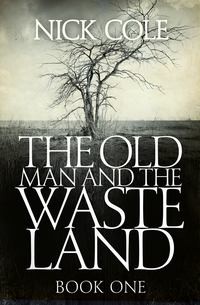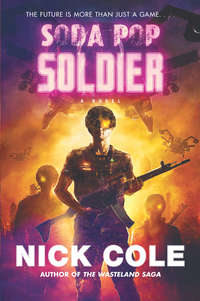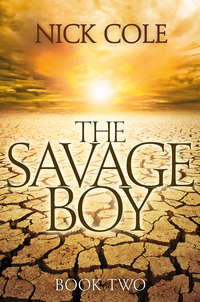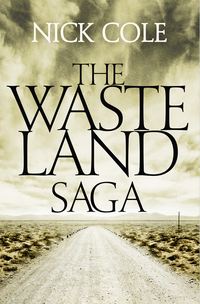
Полная версия
The Road is a River
The dark man-shadow, before the setting sun, seemed to lean toward them and out into the blistered highway as they approached. As they closed the distance between them the Old Man saw the shadow revealed. Saw him clearly as one might see something dead beside the road and want to look away in that passing instant of speed. His face was gaunt. Sun stretched by time and all the years since the end of the world. All the years on the road.
Worn rawhide boots. Faded dusty pants. A long coat made of license plates stitched together. A thick staff he leaned on heavily, though his frame was spare. Two small skulls dangled from its topmost tip. He wore a faded wide and weak-brimmed hat under which shining hawk-like eyes watched the Old Man. Had watched since they’d first appeared, the Old Man was sure of that.
He’s a killer.
The Old Man could feel the slightest decrease in their acceleration.
“No!” he shouted into his mic. “Keep going!”
The tank lurched forward, and as they hurtled past the Roadside Killer, the vessel of all things unclean, the gaunt man raised one bony arm from the sleeve of his license-plate mail coat and extended a claw-like hand that might have been a plea.
The Old Man knew his granddaughter would be staring, wide-eyed, as they raced past, throwing grit and gravel, drawing up the road behind them.
Do not look back.
The Old Man rose in the hatch, watching the highway ahead.
“Why didn’t we stop, Grandpa? He looked like he needed help.”
Do not look back.
“Grandpa?”
“Because,” said the Old Man after a moment. “Because we must help those inside the bunker.”
It was later, in the early evening, beyond a fallen collection of wind-shattered buildings the map once marked as the town of Quartzite, where they buttoned up the tank for the night. In the dark they’d settled into their bags, feeling the tank sway in the thundering wind that had risen up out of nowhere late that afternoon.
“Why didn’t we help him, Grandpa?”
The Old Man listened to the sand strike the sides of the tank and thought of some acid they’d once drained from a car battery to weaken the lock on a tractor trailer they’d salvaged.
The wind sounds like acid tonight.
“Not everyone needs our help.”
“But some people, the people inside General Watt’s bunker, do?”
“Yes, they do.”
And I wonder if they truly do. How do I know this isn’t some game, a complex game, to draw us all into a trap?
You don’t know, my friend.
“How did you know the man today didn’t really need our help?”
“I just did.”
And how will I teach you to know such things when I am gone?
“So we only help those who really need our help, Grandpa?”
“Yes. Only those whom we can tell really need our help.”
I will have to think of a better way to teach her to know how and when to help, but not tonight. I cannot think of a way tonight.
Soon she was asleep and the Old Man lay awake for a long time listening to the sand dissolving the tank, and when he slept he dreamed of the cities of the West and the stranger beside the road and serial killers and empty diners where there was no food anymore.
Chapter Fourteen
“You’re just two thousand meters away from the last known location of the tactical command post.” General Watt’s transmission was breaking up within intermittent bouts of white noise. “I have not been able to get a satellite with a working camera over the location. There are only a few operating satellites remaining, otherwise I might have been able to give you better data regarding the container’s location.”
They were passing through a wide sprawl of ancient warehouses that rose up like giant monoliths from the desert floor surrounding Barstow.
“What will this container look like?” asked the Old Man, hoping General Watt’s transmission would be understood.
“Green …” Static. “Size of a box …”
The Old Man asked the General to repeat the description, but the electronic snowstorm he listened within contained no reply. The satellite she had been bouncing the transmission off had finally disappeared far over the western horizon. The General had told them she wouldn’t be able to reach them again for another twelve hours.
The Old Man watched the silent place of massive box-like buildings. From this distance they seemed little more than dirty tombstones, but as his granddaughter maneuvered the tank up the road, he could see the telltale signs of time and wind. Metal strips had been ripped away in sections, as if peeled from the superstructure of the buildings. A place like this would have been an obvious choice for salvagers. But this is California. Everyone fled California when all the big cities had been hit. L.A. before I’d even left. San Diego a day later. But there was no sign of the box General Watt said they must find.
And what is in this box?
The Old Man shut down the tank.
They were exactly where General Watt had said they would find the tactical command post. And somewhere nearby would be the container, but there was nothing. No command post.
Dusty, wide alleyways led between the ancient warehouses.
If it was a small box, what would’ve prevented someone from merely carrying it away?
Then it must be a big box, my friend.
“Maybe it’s in one these buildings, Grandpa.”
They left the tank, feeling the increasing heat of the day rise from the ancient pavement of the loading docks.
Inside they found darkness through which dusty shafts of orange light shot from torn places in the superstructure. The Old Man clutched his crowbar tightly, stepping ahead of his granddaughter. There is a story here. A story of salvage. If you tell the story, you’ll find the salvage. He waited, letting his eyes adjust to the gloom. You know part of the story. The General told you that part.
The days of the bombs had begun. Los Angeles was gone. But the Chinese, which was news to me because that must have happened after Yuma, were invading the western United States. The military, the Third Armored Division, or so General Watt said, staged its forces here in the deserts of Southern California. Supplies were air-dropped in as well as tanks and soldiers. They would counterattack the Chinese on American soil.
Imagine that.
At least they were supposed to have. But what happened in those days of bombs and EMPs and the rumors that spread like a supervirus is not clearly known and all the General can tell me is what was known. What was known before the jury-rigged, EMP-savaged communications networks that were able to route traffic through the bunker at Cheyenne Mountain collapsed. What was known before everything went dark.
And after?
The success of the counter-attack?
The tanks and soldiers?
The Chinese?
During those first days as we walked east, away from the Great Wreck, I had thought the world had ended. But in truth we knew so little of the story because who really knew everything that was going on and how could they tell us as we carried our possessions in our hands along the highway. The world had gone on ending long after we thought it was dead.
Nothing is known clearly now, and it is no longer important on this hot day forty years later.
The important matter for today is to find a container that was air-dropped and went wide of the landing zone as soldiers and tanks readied themselves to meet the enemy. The container’s GPS locator broadcast for years. But even that fading signal ended a long time ago.
“What’s inside?” the Old Man had asked General Watt.
“I’ll need to explain that later. I only have a limited time to communicate with you before the satellite I’m currently hijacking disappears over the Pacific horizon. Find the container and get it open. I’ll explain what you’ll need to do once you’ve obtained the supplies.”
Why do I have the feeling bad news has made an appointment?
Because you are cautious, my friend. And right now is the time to be cautious. So if you are cautious, you are doing well.
If we were on the boat I dreamed of last night, Santiago, seeing the flying fish jump, watching our lines, waiting for the big fish that was like a monster to come up from the deep to fight him together, you would say such things to me when my confidence was low.
Confidence can work both ways, my friend.
Yes, there is that.
That is not important now. Right now you need to find this box, my friend. Later you can decide how you feel about the bad news that you fear might be inside.
There is a story here also. A story of salvage.
The Old Man searches the gloom of the warehouse and sees very little. He smells wood smoke and decay from long ago.
Dead animals. Dried blood. Huddled bodies. Decay.
“Go to the tank, please, and bring me back the flashlight,” he whispers to his granddaughter.
When she returns, he scans the interior of the warehouse with the beam. Its light is weak and barely penetrates the dark. All batteries are old now in these many years after the bombs.
They walk forward into the gloom. She has brought a flashlight for herself also and he watches her beam move with energy, like her, never staying in any one place for too long, also like her. His beam is slow and searching. He finds the remains of the campfire in the center of the warehouse before she does. It was a large fire.
Around it are storage racks and iron beams, arranged as though many might sit and watch the fire through long winter nights that must have seemed unending and as though the entire world was frozen forever.
I know those nights.
I know those fire-watching nights.
I am always hungry when I think back on them and the howling wind that was constant.
You were very hungry then.
The whole world must have been hungry.
But there is no box here.
They search the building, even shining their lights into the high recesses of the fractured roof.
There is nothing.
In the next building, the centermost of the three, they find the remains of the same style bonfire, and she, his granddaughter, on the farthest wall, at the back of the massive warehouse, finds the drawings.
Taken in parts they are merely a collection of scribblings.
Stick figure people. A Man-Wolf. Slant-Eyed Invaders waving guns. Mushroom clouds. Stick figure people who wear the wide-brimmed hat. Like that Roadside Killer. Stick figure people with spikes that come from the tops of their misshapen heads. Many dead Spike Heads. The bonfire. The Hat People stare into it.
“Who are they, Grandpa?”
Her voice startles him in the gloom beyond the cone of light he stares into, trying to know the meanings of these scribblings.
“I don’t know.”
He follows the drawings from left to right and finds no mention of the container.
He finds they are a people. A people who wore hats like the one the Roadside Killer wore. A people surrounded by decay who waited through the long winter after the bombs and stared into fire.
A people like his village. The same and different.
Mushroom clouds.
The Man-Wolf leads them all away.
Leads them toward the Slant-Eyed Invaders who wave guns and trample over other stick figures beneath their stick feet.
“I don’t know,” he says again, his voice swallowed within the quiet.
And he realizes he is all alone.
“Where are you?” he calls out.
From high above he hears her voice.
“I found a ladder, Grandpa.” She is straining to pull herself up. “If it leads to the roof, I can look around and see where the box is.”
He shines his light about and can see nothing of her.
His mind thinks only of rusted metal and snapping bolts that pull away from crumbling walls with a dusty smuph.
And falling.
A moment later he hears metal banging on metal and knows it to be the sound of a crowbar smashing against a door. The sound is a familiar cadence to him and reminds him for a moment of the comforts one finds in what one does. The music of salvage.
He shines his light high into the rafters and finds her against the ceiling.
She is so small.
She is so high up.
I regret all of this.
Her crowbar gives that final smash he knows so well, when the wielder knows what must give way will give way with the next strike, and a frame of light shoots down within the darkness, illuminating the Old Man.
“I’m through, Grandpa!”
No one will ever stop you will they?
“I’m going up, Grandpa.”
Please be safe!
A few minutes later, the longest minutes of the Old Man’s life, he can hear her voice shouting down into the darkness in which he stands.
“I see it, Grandpa! It’s on the roof of another building. It’s very big.”
Later, after her descent, in which he can think of nothing but her falling and knowing he will try to catch her and knowing further that both his arms will be broken and that it doesn’t matter as long as he saves her so he must catch her, they climb again onto the roof of the other building.
The yawning blue sky burns above their heads as they crawl out onto the wide hot roof.
The roof is bigger than a football field.
Along a far edge, the container, its parachute little more than scrappy silk rags, sinks into the roof.
The Old Man approaches cautiously, feeling the thinness of the roof beneath his feet. He waves for her to stand back and let him go on alone.
When she obeys, he proceeds, one cautious foot after the other, ready to fling himself backward onto the burning floor of the roof.
At the container he finds the heavy lock.
He knows this kind of lock. He has broken it many times and if one knows how to use a crowbar, the design of the container and the position of the lock will do most of the work.
The Old Man knows.
Forgetting the precarious and illusory roof, thinking only of salvage, blinded by salvage, he breaks the lock.
The doors swing open on a rusty bass note groan.
The Old Man smells the thick scent of cardboard.
Inside, stacked to the ceiling of the container are thin boxes, one lying atop another, long and flat.
He takes hold of the topmost and drags it away from the container onto the roof and back a bit where he feels it will be safer to stand.
Bending over the box he reads, seeing his granddaughter’s little girl shadow lengthen next to his, as the day turns past noon. He reads the words the military once printed on these long flat boxes.
“Radiation Shielding Kit, M-1 Abrams MK-3, 1 ea.”
Chapter Fifteen
“By the time communication with the outside world had completely failed,” explained General Watt after they’d re-established contact, “fourteen military-grade nuclear weapons had already been used within Colorado alone. I determined that it would be beneficial to you and your team to obtain a shielding kit in order to protect you, once you enter Colorado.”
The Old Man watched the radio, thinking.
He held the mic in his trembling fingers, his weathered thumb as far away as possible from the transmit button.
“We have no idea …” General Watt paused, her voice tired. “I have no idea how bad things are above. But I wanted you to have some protection. Just in case. That’s the reason I directed you to obtain the Radiation Shielding Kit.”
“And was that also the reason you didn’t tell us what we were going to find until we found it?”
You know the reason, my friend. You are angry at someone because they lied to you in order to save their life.
I am angry because …
Because of that, my friend. Because of that, and nothing more.
“Is there anything else you’re not telling us, General?” asked the Old Man.
“No,” replied General Watt. “There is nothing. I know very little beyond our limited access to a failing satellite network. In truth …”
Pause.
Static.
The Old Man saw the satellite in his mind, aging, drifting steadily out over the Pacific horizon once more.
“The truth, General.”
“Call me Natalie.”
“The truth, Natalie,” said the Old Man softening his tone.
“The truth is, I don’t even know if this plan will work. It is merely our last chance. I didn’t want to tell you about the Radiation Shielding Kit because I estimated that you might not want to become involved if you knew there was a possibility of being exposed to high levels of radiation. Though I have no contact with those on the surface, I hypothesize that a fear of radiation poisoning has evolved into a healthy respect, if not outright avoidance policy, among postwar communities.”
Sometimes she sounds so detached. As if the world is little more than mathematical chances and equations that must be solved so that an answer can be found.
And hoped for, my friend. After so many years of living underground, what else might she have except some numbers that give her hope?
And if I know she is lying to me, why are we continuing down this road?
Because you don’t know if she is lying to you.
“All right, General,” said the Old Man. “I’m sorry. Thank you for trying to protect us.”
I should turn back now. We …
“Natalie.”
“Natalie,” agreed the Old Man.
Natalie.
“The shielding kit will protect you through most of southern Colorado. All you have to do is get close to the collapsed backdoor entrance and then aim the Laser Target Designator at the back of the mountain. We’ll do the rest.”
The rest.
Do I want to know what the rest is? Not today. There has been too much already for just today.
That is the love of letting things go for now.
The day that follows is hot and dusty.
They pass through the crumbling remains of eastern Southern California.
All day long they maneuver through scattered debris, time-frozen traffic jams, and long-collapsed overpasses while the Old Man scans the western horizon.
I was raised over there, beyond those mountains that stand in the way, near the sea. Like you, Santiago.
I have not thought of those places since the bombs. Which is not true.
In the days after, I thought of them all the time.
And then you married your wife and forgot them, my friend.
Yes. There was the work of salvage and you had to concentrate to dig out its story. There was no time for where I had come from. There was no time to think of where I could never go again. There was salvage. My wife. Our shack. My son. His family. My granddaughter. They were my salvage and they replaced all those burned-up places that were gone.
“Grandpa, how will we know where the 395 is?”
I thought only of them, my new family, in the days that followed the bombs.
“Roads lead to roads,” he said. “If we follow this big road, we will find another road. In time we will find this little highway once called the 395.”
The dull hum of the tank’s communications system.
“Some always leads to more, right, Grandpa?”
“Right.”
Some always leads to more.
That night they camp near the off-ramp at the intersection where the big highway spends itself into the untouchable west and the little ribbon of road the map names the 395 drops off into the lowest places of the earth. Death Valley.
They eat rations heated in the Old Man’s blue percolator and sit around a campfire made of ancient wood pulled from the wreckage of a fallen house built long before the bombs and well before the science that would reveal their terribleness.
Yucca trees, spiky and dark, alien against the fading light, surround them and the silent tank.
The Old Man thinks of the fuel gauge and its needle just below the halfway point.
The drums atop the tank are empty.
If you think all night you will not sleep, my friend.
Natalie says there will be fuel, of a sort, in China Lake.
General Watt.
Natalie.
She sounds old. Like me. “Grandpa, why do they call it the Death Valley?”
She has been quiet for most of the afternoon. Her questions have been few, as though the place that makes all her questions is overwhelmed by the road and our adventure upon it.
Maybe the world is bigger than she ever imagined, my friend.
“It was called Death Valley even before I was born.”
“So not because of the bombs?”
“No. When people first crossed this country I guess they didn’t like Death Valley, so they chose a bad name for it.”
“Did everyone avoid it?”
The Old Man tries to remember.
Instead, he remembers other things.
Ice cream.
A place he worked at.
Steam.
The beach.
“No, I remember people went there on vacation. It was a place people needed to go and see what was there.”
She watches the fire.
He can see each question forming deep within her.
I can almost snatch them out of the air above her head.
Tonight, when I sleep, I would like to really sleep. Only sleep, and no nightmares.
Especially the one nightmare.
Yes.
The one in which she is calling you as you die, as you abandon her.
As you fall.
As you leave, my friend.
Yes. That one.
No, Grandpa, I need you.
Yes.
“Will it be dangerous there?” she asks.
The Old Man searches the night for one of Natalie’s satellites.
“No. No more than any other place we have been.”
“I’m not afraid, Grandpa. Just the name, it’s a little scary.”
“Yes. Just a little.”
She laughs.
I know what it is like to be afraid of a name and also a nameless thing. My sleeping nightmare is like Death Valley to her.
“Since we might be the first people to cross Death Valley in a long time, we could give it a new name. One that isn’t so scary.”
She stops chewing and he watches the machine inside her turn. The machine that makes an endless supply of questions. The gears and cogs that labor constantly so that she becomes who she will become in each moment and the next.
Sometimes she is so exact.
It might be against her rules to change the name.
To change the game.
No, Grandpa. I need you.
I would change that if I could.
“What could we call it?” she asks.
She is willing to rewrite history. Willing to make something new. Willing to change the rules of the game.
“I don’t know. I guess … when we get there we could see what we think of it and then come up with a new name. What do you say about that?”
They both hear a bat crossing the lonely desert, flying up the desolate highway, beating its leathery wings in the twilight.
Tomorrow we will follow him beyond those rocks and down into the desert at the bottom of the world.
“I would like that, Grandpa. Yes.”
In the dark, the Old Man is falling into even darker depths.
I was falling.
No, Grandpa. I need you.
Yes.
The nightmare.
If only I could change it like we’re going to change the name of Death Valley.
The Old Man drinks cold water from his canteen.
His granddaughter sleeps, her face peaceful.
No, Grandpa. I need you.
The Old Man lies back and considers the night above, though his mind is really thinking of, and trying to forget, the nightmare all at once.
I wish I were free of it.
I wish I could change the rules of its game.
If she called me by another name, then the nightmare wouldn’t frighten me anymore. Then, I would remember in the dream that she calls me by another name and I could hold on to that.
And thinking of names, his eyes close and the sky above marches on and turns toward dawn.






